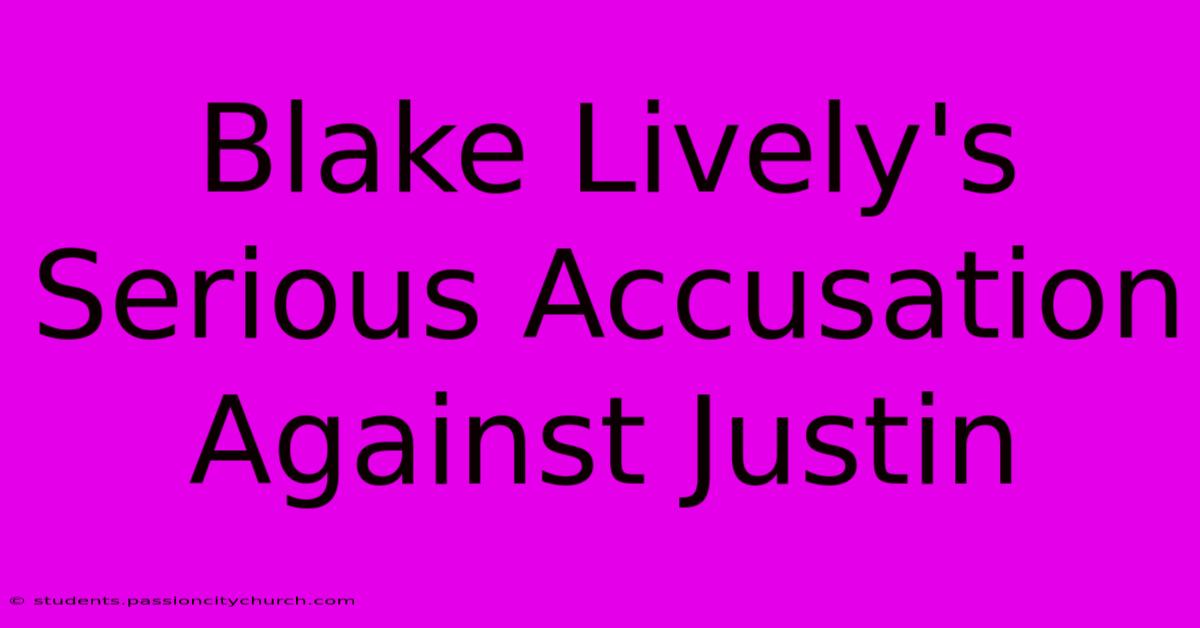Blake Lively's Serious Accusation Against Justin

Discover more detailed and exciting information on our website. Click the link below to start your adventure: Visit Best Website. Don't miss out!
Table of Contents
Blake Lively's Serious Accusation Against Justin: Unpacking the Rumours and Speculation
The internet is abuzz with speculation regarding a supposed serious accusation made by actress Blake Lively against a Justin. However, it's crucial to preface this discussion with a vital disclaimer: no verifiable, credible source has confirmed a specific serious accusation made by Blake Lively against any individual named Justin. This article aims to analyze the online chatter, address the lack of concrete evidence, and explore the dynamics of rumour-mongering in the digital age. The prevalence of this rumour underscores the importance of media literacy and critical thinking when consuming online information.
The initial spark appears to originate from fragmented social media posts and gossip forums, quickly escalating into viral speculation. Many of these posts lack verifiable sources and often present information out of context, leading to widespread misinformation. The ambiguity surrounding the identity of "Justin" further fuels the flames, as several high-profile individuals named Justin are readily associated with Blake Lively, both professionally and potentially personally. This ambiguity allows for a wide range of interpretations and fuels the rumour mill.
The Power of Ambiguity and Online Gossip
The lack of concrete details is a key element in the virality of this rumour. The vague nature of the alleged accusation allows users to fill in the gaps with their own interpretations and biases, resulting in a snowball effect. Each retelling of the story may slightly alter the details, adding layers of embellishment or speculation. This is a classic example of how information distortion occurs online, particularly in the absence of reliable sources.
The rumour's spread relies heavily on the pre-existing public interest in Blake Lively and high-profile figures generally. Celebrities are often subject to intense scrutiny, and any hint of scandal, however unsubstantiated, is likely to garner significant attention. This intense public interest provides fertile ground for the propagation of baseless rumours, as the demand for gossip overshadows the need for factual verification.
Examining the Role of Social Media
Social media platforms, while connecting individuals globally, also serve as breeding grounds for misinformation. The rapid spread of information without proper fact-checking mechanisms can have serious consequences. The viral nature of these platforms means even unsubstantiated claims can gain traction quickly, impacting reputations and causing unnecessary harm. The ease with which rumours are shared and amplified through retweets, shares, and comments contributes to the problem.
Moreover, the anonymous nature of some online platforms further emboldens the spread of unsubstantiated claims. Individuals feel less accountable for spreading misinformation when they can remain anonymous or use pseudonyms. This lack of accountability allows for a more reckless dissemination of rumours without fear of repercussions.
The Importance of Media Literacy and Critical Thinking
In the face of such rampant online speculation, media literacy is paramount. Learning to critically evaluate information sources is crucial for navigating the complexities of the digital landscape. Asking key questions such as:
- Who is the source of this information? Is it a reputable news outlet, a verified individual, or an anonymous account?
- What evidence is presented? Are there verifiable facts, or is it solely based on speculation and rumour?
- What is the motivation behind sharing this information? Is it to inform, entertain, or cause harm?
- Are there other credible sources corroborating this information? A single source is rarely sufficient for verifying a claim.
These questions can help individuals discern factual information from misleading or malicious content.
The Legal Implications of False Accusations
It's essential to recognize the legal ramifications of spreading false accusations. Defamation, libel, and slander are serious legal offences that can result in significant consequences for those who disseminate false information causing reputational damage to others. Even if the intention is not malicious, spreading unsubstantiated rumours can have severe legal and ethical repercussions.
Conclusion: The Need for Responsible Online Behaviour
The alleged serious accusation against Justin by Blake Lively, despite its lack of concrete evidence, highlights the dangers of unverified information spreading rapidly online. The rumour's virality underscores the urgent need for greater media literacy, critical thinking, and responsible online behaviour. Before sharing information, individuals should carefully assess its credibility and consider the potential consequences of disseminating false or unsubstantiated claims. The power of the internet is immense, and with that power comes a responsibility to use it ethically and responsibly. The absence of concrete evidence makes it impossible to definitively address the rumour, but the very existence of such speculation provides a valuable lesson on the importance of critical evaluation and the dangers of unchecked online gossip. We should remember that rumours, however sensational, should not be treated as facts without rigorous verification from reliable sources.

Thank you for visiting our website wich cover about Blake Lively's Serious Accusation Against Justin. We hope the information provided has been useful to you. Feel free to contact us if you have any questions or need further assistance. See you next time and dont miss to bookmark.
Also read the following articles
| Article Title | Date |
|---|---|
| Aston Villa Vence O City | Dec 22, 2024 |
| Arsenal Defeats Palace Jesus Scores Twice | Dec 22, 2024 |
| Assistir Crystal Palace X Arsenal Data E Horario | Dec 22, 2024 |
| Fury Vs Usyk Fight Results Analyzed | Dec 22, 2024 |
| Crystal Palace Vs Arsenal Dominasi Jesus | Dec 22, 2024 |
| Barcelona 1 2 Atletico Goals And Highlights | Dec 22, 2024 |
| Blake Lively Justin Baldoni A Smear Campaign | Dec 22, 2024 |
| Saturday Football Texans Chiefs Odds | Dec 22, 2024 |
| Dell Suffers Injury Hospitalized Overnight | Dec 22, 2024 |
| Barcelona X Atletico Campeonato Espanhol Ao Vivo | Dec 22, 2024 |
